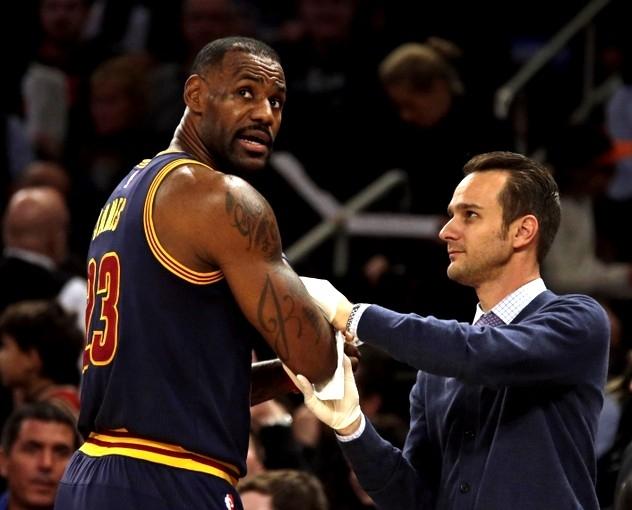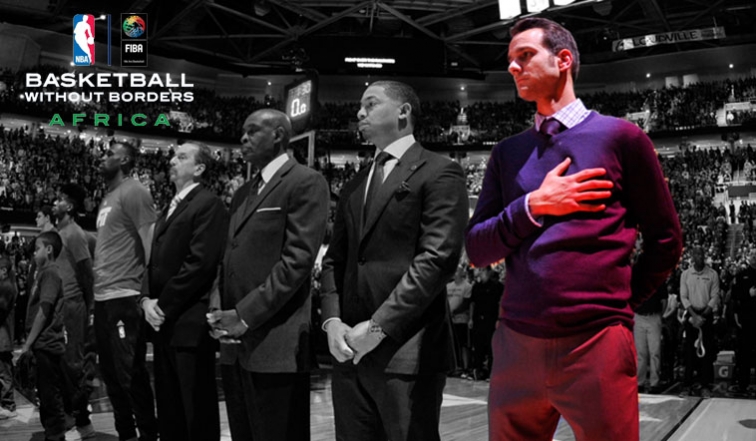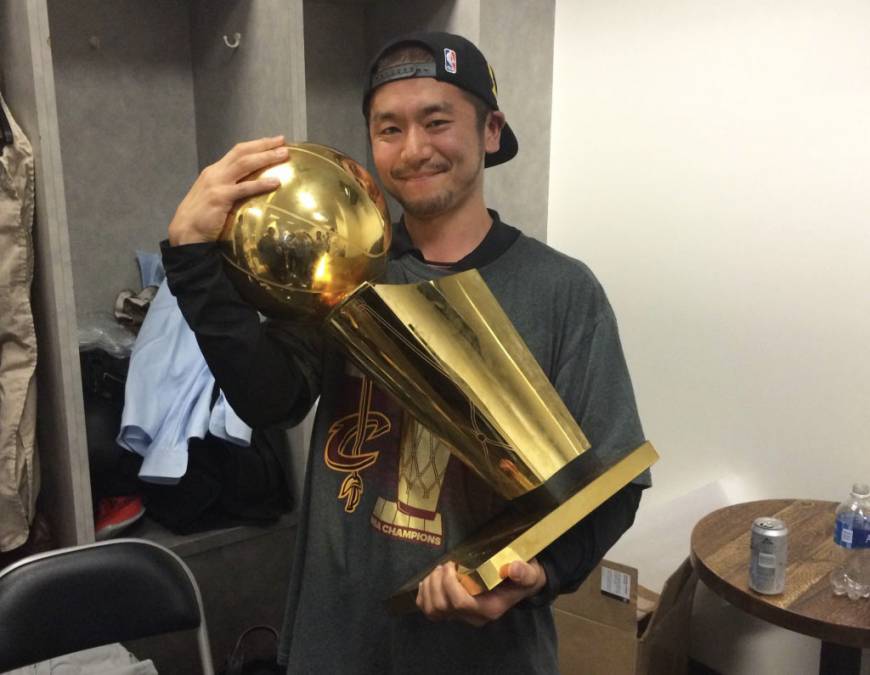
Article reposted from Wicked Local Wareham
Author: Dick Trust
The world of Steve Spiro is wide and wonderful, having expanded from his memorable days at Wareham High School to the exhilaration of being part of a championship team in the National Basketball Association.
Spiro is head athletic trainer of the Cleveland Cavaliers, who overcame a 1-3 deficit in games against the defending champion Golden State Warriors and won the seven-game Finals for the 2015-16 NBA title.
“Not to be cliché, but there are really no words other than pure joy that can best describe what the feeling was throughout the NBA Finals and eventual championship,” Spiro, 36, said.
“I feel very fortunate to be in the situation I am, knowing there are very few people who get to experience winning a championship at the NBA level.”
Athletic trainers in the NBA wear many hats and dedicate themselves to their profession, the primary function of which is prevention, care and rehabilitation of injuries. Implementation of conditioning and fitness programs also rank high on their to-do list.
“It’s a chosen lifestyle we take on,” said Spiro, who is married with two young daughters. “There’s a lot of sacrifice that you make (long days and late nights, extended time away from home, missed holidays), and having a great support system at home is a must.
“To get the chance to win an NBA championship and experience all the emotions and elation with my family and friends was something that makes the sacrifice worth it.”
Although Cleveland was down, three games to one, going back to Golden State, the vibe around the Cavaliers remained positive and confident that “we would do something historic,” Spiro said. “My wife, Abbey, told me, ‘If the city of Cleveland was going to win its first championship in 52 years, this was the way it would have to be done.’ ”
So it was.
“Throughout the day and during Game 7 there were just so many emotions,” Spiro said, “but you got the feeling from the players what we were about to do. Their confidence and grit were palpable.
“When that final buzzer sounded, being on the court with those guys and staff was such unfiltered emotional joy that you just don’t have anything to compare it to. Celebrating an achievement by spraying champagne in a locker room is something you can get used to.”
LeBron the leader
Having LeBron James playing for Cleveland was just what the doctor – or head athletic trainer – ordered. He had complementary troops with him, of course, but LeBron was the field general.
“It was such a team/group effort to be able to accomplish winning a championship,” Spiro said. “It started in September, ended in June. There is just so much that goes in the day-to-day grind, some of which you read about in the papers, and other stories and memories that I get to keep personal that will be with me for the rest of my life.
“The players deserve all the credit for achieving the championship, and being a part of that journey, having my own role in our team’s success, was a lot of fun.
“It all starts when your best player is your hardest worker. LeBron epitomizes what it is to be a leader, and to get to witness first-hand how he goes about his craft is truly special. The drive he has to be great and to lead this team to a championship is unmatched. It’s an infectious trait that spreads to everyone in the organization. To watch him every day the past two seasons has been special and inspirational.”
Spiro has completed three years as the Cavs’ head trainer after three as assistant. He had worked at his alma mater, Temple University, for six years on staff as the primary athletic trainer for the men’s basketball team when he received a phone call from a colleague at another university with whom he had become a close friend.
“He told me he had given my name to his connection at the Cavs because they were looking for a new assistant athletic trainer,” Spiro said.
After three years as assistant, he became, at the time, the youngest head athletic trainer in the NBA (34).
Early inkling
Spiro said he was “fortunate” to have known during his senior year (1997-98) at Wareham High that he’d like to become an athletic trainer.
“I joke that everyone has to retire from their sports career at some time; mine just happened to be at 18,” said Spiro, an Onset native who at Wareham played baseball and basketball and ran cross country.
“Sports, athletics, and competition are such a large part of my life and I wasn’t willing to just give that up, even if my playing days were over after high school.
“My father (Thomas Spiro) worked as a physician’s assistant and seeing his work influenced me to want an active role in the health/medical profession. Combine my love for sports, becoming an athletic trainer was a perfect fit to combine both of my interests.”
Spiro earned his bachelor’s degree in kinesiology, with the concentration in athletic training, at Temple. He followed that with a master’s from the University of Miami (Fla.).
After spending 2004 interning with the Pawtucket Red Sox, he said he was “grateful to end up back at Temple on the athletic staff working with men’s basketball and other Olympic sports.”
Spiro’s support system at home in a Cleveland suburb includes wife Abbey, and daughters Mary, 2½ years old, and Caroline, 4 months old.
You’re barking up the wrong tree if you don’t believe that the Spiros’ 5-year-old yellow lab, Tessie, is a positive force, as well.
“She’s a part of our family,” Steve said of their dog, “and gets along incredibly with her two sisters, Mary and Caroline.”
Into Africa
Spiro went to Africa late this summer, visiting Angola and South Africa on a 10-day trip with the NBA’s Basketball Without Borders program. Featuring an array of NBA players and support staff, the league annually reaches out not only to local communities, but also globally.
“I’m grateful for this opportunity to see different cultures and environments,” Spiro said. “It’s exciting to see Africa’s embracing of the game of basketball and how it can unite so many people.”
His role was to help lead daily life-skills sessions focusing on the importance of education, leadership, character development, health and wellness.
What is Spiro’s long-range plan, career-wise?
“Right now, I couldn’t be more excited to be in Cleveland and working for the Cavaliers’ organization,” he said. “Still being only 36 years old, having the opportunity to keep working with some of the best athletes in the world, and being challenged daily in my role as head athletic trainer, has me very motivated to keep doing what I’m doing.
“Long term, I think it would be exciting to be able to open up a performance center within a community – much like Wareham – use my education and professional experiences to focus on all ages of the active population and help with injury prevention, recovery, and corrective/performance enhancing exercise programs.”
Give me a W, give me an A . . .
No matter what he has accomplished, or will, Spiro has never forgotten his formative high school days.
“I’m extremely proud and excited to say that I’m a Wareham High School grad,” he said. “I enjoy carrying that flag. I have so many great memories with friends, teachers, and coaches. They have shaped who I am and always gave me the confidence to pursue dreams.”
He’s living some of those dreams right now.

